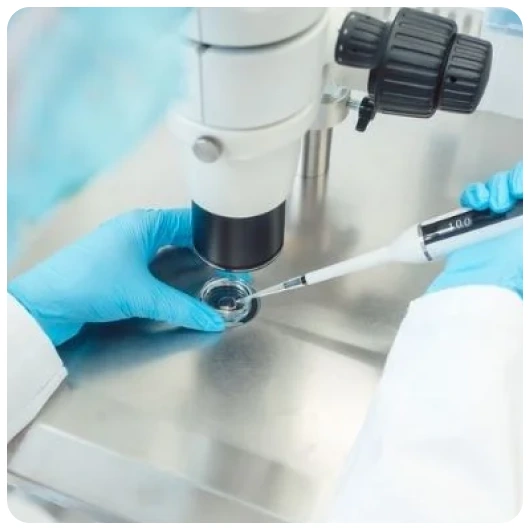PICSI, or Physiological Intracytoplasmic Sperm Injection, is an advanced technique in assisted reproductive technology (ART) that significantly improves the success rates of in vitro fertilization (IVF). Unlike traditional methods, PICSI utilizes the natural binding ability of sperm to hyaluronan, enhancing the selection process based on sperm functional quality.
Hyaluronic acid, naturally present in the female reproductive tract, plays a crucial role in sperm selection. Mature sperm with specific receptors for hyaluronan are chosen, promoting better morphology, reduced chromosomal abnormalities, and improved DNA integrity.
When is PICSI Recommended?
PICSI is particularly recommended for couples facing challenges such as high DNA fragmentation in sperm, advanced maternal age, previous failed IVF cycles, poor embryo development, or a history of recurrent miscarriages.
How PICSI is Performed?
- Preparation of Hyaluronan-Coated Dish: A specialized dish coated with hyaluronan mimics the natural environment of the egg.
- Semen Sample Collection: The male partner provides a semen sample, which is processed to isolate healthy sperm.
- Sperm Selection: Processed sperm are placed on the hyaluronan-coated dish. Only sperm with optimal binding to hyaluronan are selected.
- Identification and Injection: The selected sperm are identified under a microscope and individually injected into retrieved eggs using intracytoplasmic sperm injection (ICSI).

Why Choose Medicover Fertility

0
+ Lakhs Happy Patients
0
+ BabiesBorn Every Year
0
+ IVF BabiesBorn Every Hour
Advantages of Using PICSI
- Enhanced Embryo Quality: By selecting sperm with superior fertility potential, PICSI improves the quality of embryos transferred during IVF.
- Higher Success Rates: Studies show increased pregnancy rates and decreased miscarriage rates compared to traditional IVF methods.
- Reduced DNA Fragmentation: Minimizes the risk of DNA damage by selecting sperm with intact DNA, improving overall IVF outcomes.
When is PICSI Indicated?
PICSI is specifically indicated for couples experiencing low sperm motility, abnormal sperm morphology, or high levels of DNA fragmentation, aiming to enhance fertilization and embryo development success.
Is PICSI Better than ICSI?
PICSI complements ICSI by enhancing sperm selection through physiological binding to hyaluronan, offering additional benefits in improving IVF success rates.
Ready to take control of your journey to parenthood?
Book your Appointment and start your path towards Parenthood Today !
Frequently Asked Questions
How does PICSI differ from traditional IVF?
Traditional IVF selects sperm based on motility and appearance, while PICSI selects sperm based on their ability to bind to hyaluronan, aiming to identify more mature and potentially healthier sperm.
Are there any special requirements for sperm donors in PICSI?
Sperm donors for PICSI undergo screening similar to traditional donors, but they must also exhibit specific characteristics related to hyaluronan binding, which may involve additional testing or criteria.
Is PICSI suitable for all types of male infertility?
PICSI is most beneficial for male infertility with issues like poor sperm motility or abnormal morphology. It may be less effective for severe sperm abnormalities or azoospermia, where other treatments or donor sperm could be considered.
How long does the PICSI procedure typically take?
The PICSI procedure itself usually takes about 10-15 minutes per mature egg (oocyte), but the overall treatment timeline includes preparatory steps like ovarian stimulation, egg retrieval, and embryo transfer.
What happens if PICSI does not result in pregnancy after multiple attempts?
If PICSI fails to result in pregnancy after several attempts, your fertility specialist may review treatment protocols, conduct additional testing for factors affecting fertility, or suggest alternative assisted reproductive technologies.